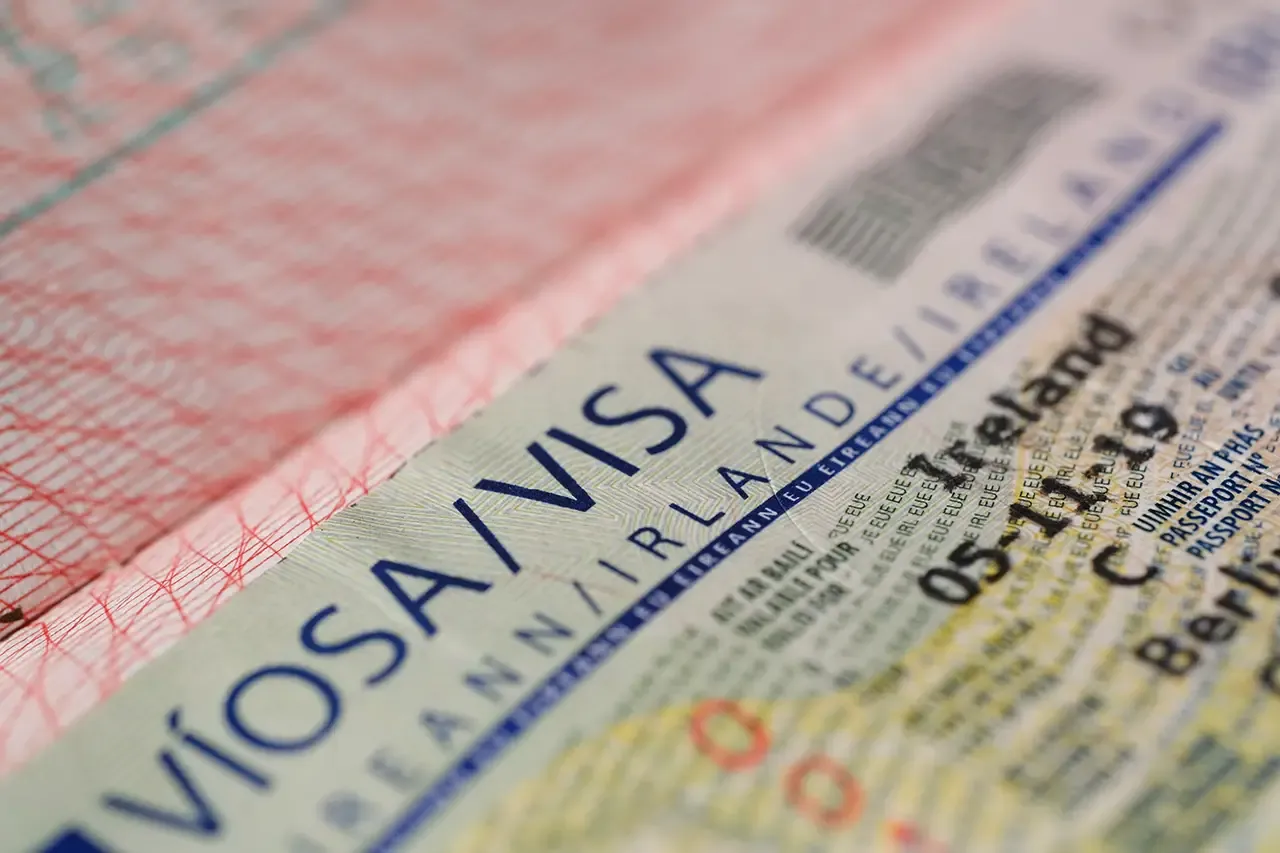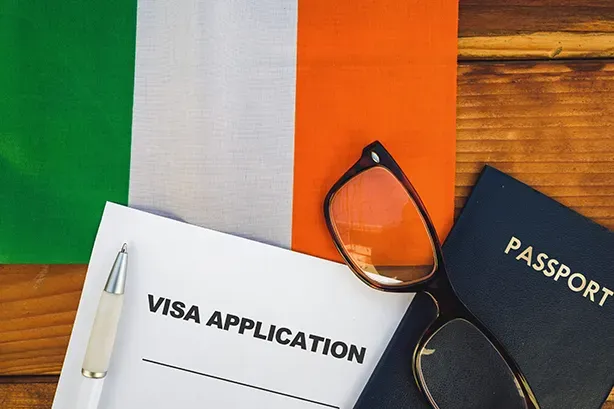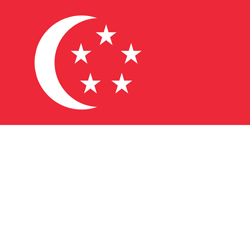Traveling to Ireland
Ireland is known for its unique culture, warm local population, and breathtaking natural beauty. It is also home to vibrant cities and towns like Dublin, Galway, and Cork. Each year, millions of tourists travel to the island nation to explore all it offers. For many nationalities, visiting Ireland is possible by obtaining an Ireland tourist visa before arriving in the country.

Who Needs an Ireland Visa?
The following nationalities must apply to obtain a short stay ‘C’ visit (tourist) visa in advance, before arriving at the port of entry in Ireland:
Afghanistan, Albania, Algeria, Angola, Armenia, Azerbaijan, Bahrain, Bangladesh, Belarus, Benin, Bhutan, Bosnia and Herzegovina, Burkina Faso, Burundi, Cambodia, Cameroon, Cape Verde, Central African Republic, Chad, China, Colombia, Comoros, Congo, Congo (Dem. Rep.), Cuba, Djibouti, Dominican Republic, Ecuador, Egypt, Equatorial Guinea, Eritrea, Ethiopia, Gabon, Gambia, Georgia, Ghana, Guinea, Guinea-Bissau, Haiti, India, Indonesia, Iran, Iraq, Jamaica, Jordan, Kazakhstan, Kenya, Kosovo, Kuwait, Kyrgyzstan, Laos, Lebanon, Liberia, Libya, Madagascar, Malawi, Mali, Marshall Islands, Mauritania, Mauritius, Micronesia, Moldova, Mongolia, Montenegro, Morocco, Mozambique, Myanmar, Namibia, Nepal, Niger, Nigeria, North Korea, North Macedonia, Oman, Pakistan, Palau, Palestinian Territories, Papua New Guinea, Peru, Philippines, Qatar, Russia, Rwanda, Sao Tome and Principe, Saudi Arabia, Senegal, Serbia, Sierra Leone, Somalia, South Africa, South Sudan, Sri Lanka, Sudan, Suriname, Syria, Taiwan, Tajikistan, Tanzania, Thailand, Timor-Leste, Togo, Tunisia, Turkey, Turkmenistan, Uganda, Uzbekistan, Venezuela, Vietnam, Yemen, Zambia, and Zimbabwe.
Ireland Tourist Visa Validity
The short stay ‘C’ visit (tourist) visa is intended for eligible nationals who plan to travel to Ireland for touristic activities. The tourist visa is valid for 90 days from the date of arrival in Ireland. The tourist visa is usually available as a single-entry visa, and occasionally granted as a multiple-entry visa. Extensions for the tourist visa are only granted in the case of emergency or exceptional circumstances.
Ireland Tourist Visa Requirements
To apply for a tourist visa to Ireland, all applicants will need to gather the required documents to be sent to one of the pre-approved application offices. While the visa application can be completed online through the AVATS portal, the following documents will need to be collected and sent to the application office:
Application summary sheets
After completing the Ireland tourist visa application through AVATS, the applicant will be able to access their application summary sheets. These should be printed, signed, dated, and included in the visa application materials. Failure to do so will likely result in a refusal of the application.
Application letter
All tourist visa applicants must type or write a letter explaining why they want to travel to Ireland and submit it along with their application documents. This letter must explain a) the reason for travel, b) the dates of arrival and departure, c) the planned accommodation, and d) a description of who will pay for the trip.
Invitation letter (if applicable)
If planning to visit a family member or friend in Ireland, applicants should submit a letter (typed or written) of invitation from that individual. It should be signed and dated by the inviter and included along with the other application documents.
Holiday itinerary
The itinerary must include a description of the planned activities in Ireland and details about the applicant’s accommodation.
Medical or travel insurance
Proof of insurance does not need to be included with the application materials, but it is within the rights of the visa officer to request it before making a decision. The applicant will also need to provide it at the port of entry in Ireland.
Proof of visa payment (if applicable)
In some cases, applicants will need to provide proof of payment for the visa application fee. More information about this document can be found at the relevant application office.
Valid passport
Applicants must include a passport that will be valid for at least 6 months past the date of departure from Ireland. Photocopies of previous passports must also be provided (if available).
For anyone traveling to Ireland from a country that is not their country of residence or traveling from Ireland to a country that is not their country of residence, must include a letter explaining why and what kind of visa is required.
Passport photographs
The applicant must include two passport-sized, color photographs in their application. On the reverse side of each one, the applicant must sign their name (in their native script or language) and write their Visa Application Transaction Number from the AVATS portal, and meet the guidelines for acceptable photographs.
Proof of subsistence
Applicants must show they have adequate finances to support themselves for the entire duration of their stay in Ireland.
Proof of intent to leave
For short-stay visas, applicants must include evidence that they have sufficient ties with their country of residence and motivation to return home after their visit.
Past visa refusals (if applicable)
Applicants must disclose any former visa refusals, deportations, entry refusals, or other instances where they were officially asked to leave a country. Original letters from the relevant immigration officials must be included along with the other application materials.
All applicants must provide translations of any official documents they submit into English or Irish. Both the original and translated documents must be sent with the other application materials.
Ireland Visa Application Steps
The basic steps to apply for an Irish tourist visa are as follows:
- Access the online visa portal (AVATS)
• Applicants must create their application on the Ireland AVATS portal.
• They should select “Short Stay (C)” as the visa type and “Visit Tourist” as the reason for travel.
• Applicants can choose between single or multiple-entry options. It should be noted that multiple-entry tourist visas are only given in very specific cases. - Complete the online visa application process
The application should be completed accurately and in full. There are three pieces of information that will be provided once the application is complete:
• The Visa Application Transaction Number: This must be kept accessible for further application steps.
• The application summary sheets: These must be printed, signed, dated, and sent along with the other application materials.
• The application office address: Applicants will receive the address where they can send the application documents. This will either be the Dublin visa office, an international visa office, or an international Irish embassy or consulate. - Pay the application fee
Applicants must pay the tourist visa fee using a valid form of payment. Payment methods and currencies will differ between offices and countries. A single-entry visa will cost EUR 60 and a multiple-entry will cost EUR 100.
- Gather all required documents
Applicants must ensure they have all the necessary documents gathered and ready to send. That includes signing and dating any documents that require it.
- Send documents and passport for processing
Documents should be sent to the appropriate application office address that the applicant received upon completing their online visa application.
Ireland Tourist Visa Fees
A single-entry tourist visa for Ireland will cost each applicant EUR 60 and a multiple-entry will cost EUR 100.
Nationals from the following countries are exempt from paying the visa fee: Bosnia, Cote d’Ivoire, Ecuador, Indonesia, Jamaica, Kosovo, Kyrgyzstan, Montenegro, Morocco, North Macedonia, Peru, Serbia, Sri Lanka, Tunisia, Uganda, and Zambia.

Where to Apply
Applications for the Ireland tourist visa can be completed online through the AVATS portal and sent to the appropriate application office for processing. After submitting the online application, the applicant will receive the address for the appropriate application office. The address may belong to the Dublin visa office, a global visa office, or a foreign Irish embassy or consulate.
The applicant is required to send all supporting documents to the appropriate application office within 30 days of submitting the application on AVATS.
Ireland Tourist Visa Processing Time
It typically takes 8 weeks to process an Irish tourist visa. Processing times may vary depending on the complexity of the case.
Approved Visa Applications
If the Ireland tourist visa is approved, it will be stuck into the applicant’s passport, taking up one blank page. The passport and specific original documents will be returned to the new visa holder by mail, such as birth and marriage certificates. It is also possible to arrange a pick-up of the documents from an international visa office, or an Irish embassy or consulate.
Denied Visa Applications
If the application is denied, a “letter of refusal” will be sent to the applicant. The passport and some original documents will be returned by mail or can be collected at an international visa office, or an Irish embassy or consulate.
It is possible to appeal a refusal free of charge. The appeal must be submitted within two months from the date of the letter of refusal.
Ireland Visa Extension
For those who want to stay longer than 90 days, extensions are not readily available. Ireland tourist visas can only be extended in an emergency or under exceptional circumstances.
There are two options for extending the Ireland tourist visa:
- If the applicant was not granted the full 90 days at the port of entry and is still within the valid duration of their tourist visa, they can visit the local immigration office and ask for an extension for the full 90 days. They must present their passport and proof of a return flight.
- If the applicant must extend their tourist visa for more than the allotted 90 days, they can apply at the Immigration Service Delivery. They must submit their application and documents by emailing DRPCustomerservice@justice.ie or by post.
They must include the following documents:
- A complete and accurate visa application form
- A copy of the biometric page of their passport
- A copy of the passport page showing their entry stamp into Ireland
- Proof of medical or travel insurance
- Proof of subsistence while in Ireland
- Any additional documents i.e. medical reports









































